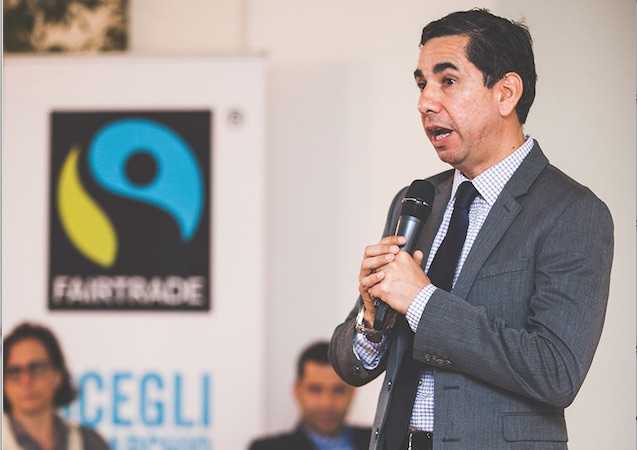Share your coffee stories with us by writing to info@comunicaffe.com.
MILAN – Dario Soto is the CEO of Fairtrade international. He comes from Colombia. He has a background in Human rights and International devolopment. He was in Milan for the presentation of Fairtrade’s Annual Report.
Where is Fairtrade International based?
“My office is located in Germany, where Fairtrade International is based. We have operations in Africa, Latin America, Asia and all European Countries. But also in Usa, Canada, Japan, Australia and New Zeland.
How much coffee does Faitrade produce?
“It’s around a third of what we produce. We are working in many commodities. The most important are coffee, cocoa, bananas, tea and flowers. Coffee is barely right now because of climate change. In fact, it is estimated that if we don’t change the path of climate changes by 2050, at least half of coffee production in the world, is going to disappear.
Speaking instead about tea, we have another issue: the living wages for tea workers in Asia. So we’re committed to work with plantations already, so that we can assure that all of the workers are receiving the minimum wage for living in good conditions.
Cocoa: also for this product, we’re very committed with the living income. With the fall of cocoa prices in the last two years, we’re seeing more and more farmers driven to poverty. This has to be changed. We want to be sure that cocoa producers in Africa are making a living out of their products. And we’re doing that through social diversification of the crops, more productivity and also, we’re going to make sure that the companies will pay a better price.”
Last year saw the highest sales for cocoa in Italy
“That’s true for Italy. Globally, instead, this information is related to bananas. We can say that cocoa is doing well right now: the growth of the impact we have is testified by our large program in Africa, which is called “Best cocoa Africa program”. And that’s where we are insisting to change the unbalance.”
Is coffee a challenge?
“For example, one thing that we’re seeing, is an increasing competition with specialty coffee everywhere. Also there’s the global challenge of climate change. Finally there’s the challenge of the large coffee sellers, the big companies, and then there are more specialized ones. How can Fairtrade talk to both and get consumers engaged to both kind of coffee.”
Is it a difficult year globaly?
“To me, the most challenge of sells is making sure that the tea workers are making living wages. We are seeing that more and more consumers in Europe, are demanding in to what’s going on in the farms in Asia. And that’s where we are focusing our efforts. “















